I’ve been thinking a lot about what I want to say about risk. About why I wholly embrace risky play for my child, and frequently encourage other parents to do the same.
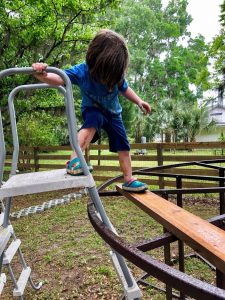
Risk, particularly risk to children, is a complicated and controversial topic in our society. None of us want to see children come to harm, and we all agree that one of the critical jobs of parents is that of protecting our children. When a child is injured, or worse, killed, society rarely holds back. “Where were her parents when this happened? What were his parents thinking, allowing him to go there / do that, etc?”
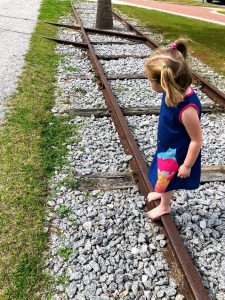
This happens in spite of the fact that parents are, as a whole, extremely cautious. Parents step in and intervene in their child’s activities and choices at the first sign that even a mild injury could occur. And we continue to blame and accuse parents in spite of the fact that, in almost every case, the parents are suffering worse than anyone when something tragic befalls their child.
There are some problems with this. There are problems with the way we place blame on parents, and there are problems with the extremes parents go to to protect their children.
I could say a lot about these problems. I could talk a lot about how abysmally bad we are at accurately assessing the actual probability of harm. I could talk about how our kids are so much safer than we seem to believe them to be. I could talk about the glaring hypocrisy we exhibit when we prevent a child’s play and exploration, citing the dangers of this activity or that, and then expose them to a far greater degree of danger simply by driving them to the park in our car. I could talk about how, when we think we’re judging risk, we’re usually really making a judgment about morality.
Most important, I could talk about the sad irony in all of this. I could talk about the fact that by denying our children the right to take risks, we are also denying them the right to the potential reward. Turns out, risky play is really, really good for our kids.
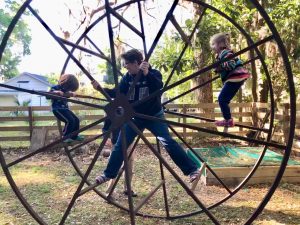
As I was contemplating all these issues, debating whether I wanted to focus on this problem or that, I suddenly realized something. There is one element that is ever-present whenever we talk about risk, but that I had been ignoring in all of my frustrated thinking about society’s problems surrounding protecting our kids. The element I was ignoring was fear. And all of a sudden, I realized my own hypocrisy. I am constantly urging myself and others to stop attempting to use logical arguments to settle emotional issues. It does not work. Emotions are not rational. And fear is no exception. Explaining that our attitudes about risk and blame don’t make logical sense might make me feel better, and justified about my choices. But would it change anything? Not likely. Fear is not logical.
And I get it. That fear is real.
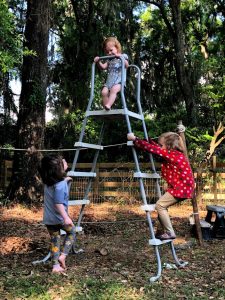
We live in an uncertain world. There is nothing we can do, nowhere we can go that is absolutely safe. A home feels safe, until it burns to the ground or silently fills with deadly carbon monoxide. Sunshine feels safe, but then it burns us and gives us cancer. Eating feels safe, but then our food chokes us, or we are brought to our knees by a nasty bout of food poisoning. Turn on the news, or browse your facebook feed, and you are guaranteed to be greeted with stories of new harm, new danger, new grief and new pain.
This element of our reality is hard enough to cope with for ourselves, but the risks are no less real or present for the most precious and innocent in our society – our infants, our children, our future. From the moment they are conceived, they are at risk. And it is our job as their parents, and as their society to ensure their safety. To guard them from the harshest elements of the world as they pass through their years of extreme vulnerability and learn to protect themselves. And we can never do enough. No matter how hard we try, how many protections we put in place, tragedy strikes. They suffer. They hurt. And sometimes, they die.
Every parent lives with the truth that the worst could happen to their child. Every parent who I’ve spoken to on this topic has, at one time or another, been nearly overcome by this paralyzing fear that their child could come to serious harm. That any one of their precious days with their child could be the last.
Imagining outcomes like that, of course we want to do absolutely everything in our power to protect our children from harm. How could I imagine that my logical arguments would mean anything? I can argue all day that the probability of harm is tiny. Who cares? If the worst should happen, what good would those kinds of statistics be? I can point out the differences between this risk or that, but that’s no good either. Just because we can’t do everything to protect our children, surely we can and should do something. The pain of losing our child compounded by the guilt that we could have prevented it is almost too much to bear, even in our imagination. And when I talk about the developmental benefits that risk provides our children, it’s almost a joke. When we imagine this tragic outcome or that, a developmental benefit has no hope of being worth the risk.

I have a child, and I have experienced this fear in my own dark hours. I’ve spent nights awake. I’ve gone to check, just one more time, that my tiny, vulnerable baby is still breathing. And, in spite of my confidence that Cat’s world is overwhelmingly safe, my brain has hijacked my imagination and I have contemplated the pain I would experience if something horrible and tragic befell my beloved child. Unspeakable loss, unbearable grief. And of course, worst of all, the guilt. Is this my fault? Could I have prevented this heartbreak? That guilt – almost worse than the rest of the pain.
But here’s the thing – the pain and loss and grief that my life has already held has taught me one unfortunate truth – in the terrible event that something tragic befalls my daughter, I will feel that gnawing guilt no matter what. My brain will put me through that torture regardless of how much actual control I had over the situation. I fully believe that making decisions with the aim of preventing that guilt is not productive. The guilt will inevitably come in the event of tragedy, a tidal wave that no flimsy barrier I can erect, no argument of “I did all I could” could stand a chance of preventing.
I have never lost a child, and I would not presume to truly understand what the experience would be like. I have every reason to believe that the experience is exquisitely and uniquely painful, unlike any other. But when I talk to parents who have experienced that particular pain, when I have read their stories, I rarely hear them urge more caution. With a few exceptions, they don’t urge me to be more careful, more restrictive. They do not encourage me to live my life with more fear.

No, the message I hear from parents who have lost their children is very different. They urge me to embrace the life I have with my child, today and each day. To take every opportunity to celebrate life, and to cherish every moment, because those moments are temporary. They have learned the terrible lesson that these precious little lives in our hands can be ripped away, with no warning, no matter what we do.
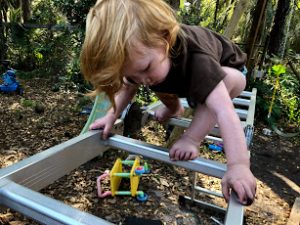
There is a tiny chance that tragedy will befall my child. And by allowing her to engage in risky play, by saying yes to almost all of her adventurous exploration, there’s a chance that I am increasing that tiny risk by a tiny margin. I consider danger and risk constantly – and I try to maintain a healthy balance between reasonable risk and sensible, logical precaution. And often, I reach the conclusion that the joy of playing in the rain is worth it, even though lightning could strike.

Life is full of uncertainty, and I have worries and concerns. But I concern myself far more with one thing about which I am absolutely certain. Cat’s childhood will end. One way or another, the joyful, innocent, messy, risky playfulness that my 4-year-old revels in day in and day out will reach its close, making way for other things. And there is one risk that I am unwilling to take. I am unwilling to steal the joy and adventure and learning from today in order to be a tiny bit more certain about tomorrow.



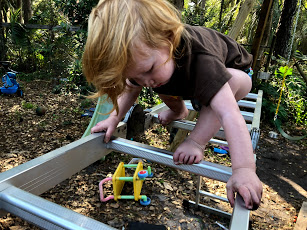
Well and truthfully written.
I have a thought- where does non safety concerns come in? I can probably guess what your answer will be, but I don’t want my daughter jumping on the couch. Not because she might hurt herself, but because she might damage the couch.
The couch is less important than my daughters happiness, but surely she can be happy in a multitude of ways that don’t involve destroying my furniture right?